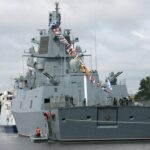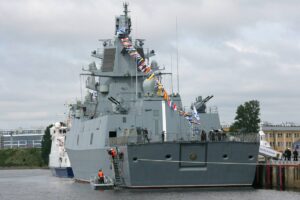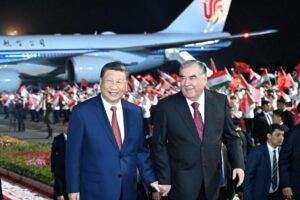Juan Manuel Pino serves as Panama’s minister of Public Security since February 5, 2020. Since then, he has been committed to focusing his country’s security agencies on teamwork as one of the fundamental aspects to combat criminal organizations, providing border security by land, sea, and air; confronting illegal migration; eradicating illegal, unreported, and unregulated (IUU) fishing; and protecting citizens, among other objectives.
To talk about his approach, Minister Pino received Diálogo at the Ministry’s offices in Panama City.
Diálogo: What does Panama’s security strategy consist of?
Juan Manuel Pino, Panama’s Minister of Public Security: The strategy is based on the government’s Uniting Forces Action Plan. The strategy contemplates actions against drugs that have worked very well and demonstrated positive results when we accounted for the seizures of 2021 and 2022. The strategy includes the Integral Citizen Security Plan, which is the prevention part, how we reach the communities, and includes weapons control, not only their seizure, but also preventive programs in the communities so that people voluntarily turn in weapons for food vouchers.
We also consider actions against organized crime, joint actions with the Public Prosecutor’s Office, where we’ve carried out large operations and have dealt decisive blows to criminal organizations since 2020. Panama and the United States signed a memorandum of understanding to establish a task force against money laundering and corruption where prosecutors, agents of the Panamanian security forces and regulatory agencies joined forces, and we received advice from the FBI.
We have the Migration Control Strategy, created to confront the migratory crisis. It’s already having an impact on Panama in economic, security, and humanitarian terms. And we have the Border Security Strategy to confront the illegal activities of criminal organizations, because Panama does not produce drugs but has contraband that comes from abroad, human trafficking, robbery, and other crimes.
Diálogo: In the last two years, Panama has seized record amounts of drugs, exceeding 100 metric tons per year. What is the reason for this success?
Minister Pino: That success has come about by uniting the efforts of the security agencies of the National Police, the National Border Service (SENAFRONT), and the National Air and Naval Service (SENAN) for a common purpose. Panama signed a memorandum of understanding with the U.S. Embassy where the Regional Air Naval Operations Center (CROAN) was consolidated, where all the intelligence information in the fight against drug trafficking arrives, and we created the Joint Maritime Force of Panama. Unifying intelligence yielded historic results in 2021 and 2022, and it’s a task that does not stop, since maritime interdictions are the most difficult and highest-risk operations at sea, especially when they are nocturnal in nature.
Diálogo: On June 2 [2023], Panama launched the Shield Campaign and Operation Chocó. What do they consist of?
Minister Pino: The Shield Campaign was born out of the Border Security Strategy, where we saw that the transit of illegal migrants was going to continue to have consequences and transformed the migratory crisis into a national security problem. Shield seeks to strengthen our border areas to combat organized crime, which is benefiting from migration. Shield also seeks to help Panama’s hard-to-reach communities in the Darién area through civil affairs and integrated action operations.
Diálogo: Panama and Colombia have strong ties of cooperation in the area of security through the Binational Border Commission, which led to the creation of a unique border security model in the region. What can partner nations learn from this model?
Minister Pino: In Panama we believe very much in strategic alliances. The historic security relationship with Colombia has resulted in the best high-impact coordinated operations against organized crime, achieved with the construction and implementation of three binational border posts in the mountains to control the scourges of organized crime, where Colombian police and soldiers and SENAFRONT interact. With Costa Rica we have plans to set up binational posts. It’s about working together with trust, since it’s the trust we have with Colombia and Costa Rica, with the security agencies, which allows us to operate against organized crime. We are an example of working together with Costa Rica and Colombia, because that’s the only way to combat the scourge of these transnational criminal organizations that have no borders.
Diálogo: What kind of mutual support is there between Panama and U.S. Southern Command’s Joint Task Force Bravo (JTF-Bravo)?
Minister Pino: I am grateful for the relationship we have with JTF-Bravo, which has supported us in times of emergency such as Hurricane Eta and others, in civilian actions of transporting modular classrooms to areas that are difficult to access and in medical tours. In 2022 we did two humanitarian operations with JTF-Bravo, this year we did one, and we have projects for January of next year.
Diálogo: Citizen participation has played an important role in the voluntary surrender of more than 1,400 weapons of different calibers through the program “Pacifying my neighborhood, building a future.” How did you get citizens involved?
Minister Pino: Getting citizen acceptance is not easy if there is no trust. We have taken this program to several provinces of Panama and people have turned in long and short arms, explosives, ammunition, combat equipment, etc. This program has been as effective as never before in the history of Panama, where a person turns in a weapon and receives a voucher for food. We believe that there are still many weapons in storage, but we have informed citizens that for example, automatic caliber weapons in Panama are prohibited and have penalties of six to eight years. Other countries have come to see how it works, but the main thing is that there is a connection with the community. The weapons that are turned in are publicly destroyed so that everyone can see what the final destination of the weapon is.
Diálogo: Panama signed an alliance with the nongovernmental organization Marine Protection Alliance (MPA) to carry out actions to confront the threats of IUU fishing. What does it consist of?
Minister Pino: The alliance consists of a monitoring platform to monitor Panama’s South Pacific protected zone, in which the Ministry of the Environment, Panama’s Maritime Authority, and Panama’s Aquatic Resources Authority are participating. The Shark Water vessel and two Panamanian-flagged boats, with crews from SENAN, the Ministry of Environment, and a crew from the MPA, will be used to help monitor and prevent IUU fishing activities.
Diálogo: The Ministry of Public Security received a U.S. donation of 63 all-terrain vehicles, model J8. How important is this donation?
Minister Pino: I want to thank the Embassy’s Office of Defense Cooperation, which processed the donation of these vehicles, the great majority of which will be used by SENAFRONT to have a direct impact on the border area of the province of Darién, to counter organized crime, since they will be used in operations for territorial control, anti-narcotics infiltration operations, verifications at checkpoints, in preventive patrols, and search and rescue actions.
Source: Dialogo Americas
















